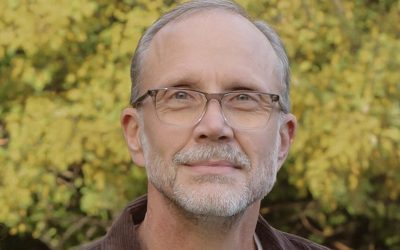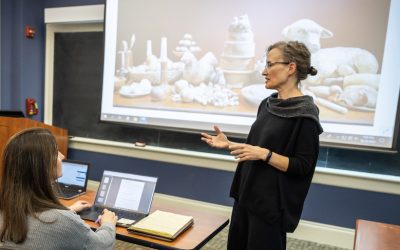The New York Times reporter and CNN analyst talks Trump, Twitter, and 2024
November 2021 – Maggie Haberman, New York Times White House correspondent and CNN political analyst, shared candid experiences and an inside look on covering the Trump presidency during a free Drew Forum event.
The virtual event, made possible by the Blanche & Irving Laurie Foundation, was the first in the Drew Forum speaker series this academic year.
Haberman has established herself as one of the country’s most respected journalists and reliable resources for expert commentary on current events and national issues. A seasoned veteran of political reporting who “just happened to be there” during much of Trump’s election and candidacy, received the Pulitzer Prize for National Reporting for coverage of the Trump administration and alleged Russian interference in the 2016 US Presidential campaign.
Lisa Lynch, associate professor and director of the New York Semester on communications and media, directed the conversation with questions surrounding Trump, Twitter, and what 2024 might look like.
When did you realize that Trump was a serious contender in the 2016 Presidential race?
Literally the minute he announced [his run for presidency]. I realized this was not a float as it had been in 2011.
He was sticking and doing well, but we attributed this to his celebrity and name recognition. Once we got to November, he was saying inflammatory things about Muslims after an overseas terrorist attack, and then there was the San Bernardino terrorist attack. He proposed a ban on Muslims entering the US, and instead of his numbers going down, they kept going up slightly. None of these controversies were sinking him. I did a piece with a colleague in January 2016 about self-described evangelicals who were backing Trump. It was clear that something was happening that was very disconnected from the national conversation.
It’s not that his coverage wasn’t rigorous, it was. I don’t think we all realized how much The Apprentice was a factor in his familiarity. It created this whole view of his business and his business acumen—which really didn’t relate to his experience as a businessman.
He reacts to things he doesn’t like, and I often write things he doesn’t like.
Describe your experience with Trump over the course of his candidacy and eventual presidency.
I knew him before he was a candidate, which very few of the reporters who covered his campaign did. He had been complaining about things I’d written about him for a decade—that has been a constant.
When he became president, I think he had this expectation that the press in Washington, DC, was going to work the way the gossip pages worked in New York—trying to trade for tidbits or plant a story. Candidly, he had more success than I would have expected in getting the national media as a group to play along his terms.
He reacts to things he doesn’t like, and I often write things he doesn’t like. He got angrier and angrier over the course of the presidency. He’s incredibly controlling about his image and what gets written about him. However, he’s uniquely focused on The New York Times, so we were still granted interviews.
The White House press corps is there to cover the presidency, they’re not there to cover Donald Trump’s personal brand. I don’t think he understood the difference, nor did he care to.
Twitter is algorithmically designed to create controversy
Twitter?
In 2016, Twitter became an indispensable news tool and everybody was on it, including the candidates. It was how Trump was communicating, so you had to be on it if you were covering Trump.
Early after the election, Trump came to the New York Times editorial board for an interview. I was asked to live-Tweet the interview and gained an insane amount of followers from this event.
Twitter became a way to break news and inform the public. Now I call it the anger video game. I think it’s gotten very toxic—a deeply angry place. It’s very exhausting. Twitter is algorithmically designed to create controversy and is disconnected from trying to put out something sober and rational.
Do you think Trump will run in 2024? Do you think he could win?
I think he’s running and my default is that he’s running until I hear otherwise. Yes, I think he could win. Objectively, I don’t think it would be easy and I don’t know what the field will look like.
Do you think the Republican party wants Trump to win?
I think some in the party do, but I do not think that Mitch McConnell is one of them, nor do I think those in the party who would like to run are among them, and governors in red or purple states are not among them. Those were four very tiring years and I don’t think Republicans want to go back down ballot.
It’s been said that the press gave oxygen to Trump’s campaign. Are there lessons to be learned from 2016 and 2020 that will alter the 2024 reporting?
The polling was really bad in 2016, and bad again in 2020. We all need to figure out what to do about public- and media-sponsored polling because it does have an impact. The turn-out models have been so questionable.
I think there was a lot of emotional reaction about reporting as if reporting was causation as opposed to reporting was just reporting. More than half the country didn’t want Trump to be the President—sometimes there’s just nothing to do, it wasn’t because the media wasn’t doing its job.
Does objective journalism exist?
I do think objective journalism exists and is incredibly important. Every reporter is a human with their own thoughts and opinions. You try to do your best to take out your personal biases and opinions. But that does not mean you should write a police blotter. It means you are writing an objective version of the truth and the truth does not always have sides. There needs to be a larger and healthier conversation on what objectivity means now, especially in this post-truth era.
Any advice for aspiring journalists?
First, you need to figure out what kind of journalist you want to be. Keep at it and try to develop as many sources as possible, take meetings with as many people as you can, and be careful what you put in an email or text—you never know what will be kicking around someday.
What’s next on your horizon?
I’m writing a book about the world that shaped Donald Trump and how he applied and recreated this world while in the White House. When I’m done I’m sure I won’t be covering the Trump White House!
Future Drew Forum events will be announced by the University in the coming weeks.



